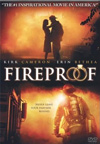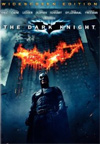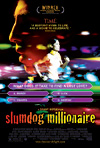So, what’s a “redeeming” film? The definition varies, but for our list below, we mean movies that include stories of redemption—sometimes blatantly, sometimes less so. Several of them literally have a character that represents a redeemer; all of them have characters who experience redemption to some degree—some quite clearly, some more subtly. Some are “feel-good” movies that leave a smile on your face; some are a bit more uncomfortable to watch. But the redemptive element is there in all of these films.
We also let each of our voters choose “One That Got Away”—a single film they wish had made the final list. Think of those extra films as sort of our “honorable mentions.”
For each of the top 10 films, we have included random comments from our critics. To learn more about the film’s synopsis, click “Our review” at the end of each summary.
  |
1. Wall•E
directed by Andrew Stanton“A meaningful masterpiece that offers as much food for thought to adults as it does to children.” “Whimsical comedy, thrilling action, threads of Noah’s Ark and 2001: A Space Odyssey, and an inspiring mechanical hero—a fusion of R2D2, Woody Allen, and Charlie Chaplin—who reminds us that humanity at its best, living responsibly and passionately, just might help us out of the mess we’ve made at our worst.” “Unconditional love.” “A wake-up call to be aware of the beauty that is round us at all times.” “A thing of beauty—a true artist’s picture that is both entertaining, provocative, subtle, sad, and joyful.” “Existential longing, awe and apocalyptic hope form the ambitious thematic terrain of this poetic, mesmerizing film.” “A timeless parable about love in the ruins—a testament to the power of love to transform darkness into light.” (Our review.)
  |
2. The Visitor
directed by Tom McCarthy“A withdrawn professor’s static life is shaken up—and ultimately enriched—by his unexpected involvement in the lives of a pair of illegal aliens.” “When Walter reaches out to two needy immigrants, he changes their lives and redeems his own, becoming a Christ-like sufferer alongside the oppressed.” “A tale about the rewards of living with courage, conscience, and compassion.” “It buys the right to discuss the U.S.’s treatment of immigrants because it was first and foremost a story of people. I cared for these people.” “Though the film tackles a weighty issue and—ultimately—provides no easy answers, it is thoroughly satisfying. It oozes goodness, humanity, and a classy reverence for dignity and trans-cultural decorum.” “A film about tricky political issues that eschews polemics in favor of real compassion.” (Our review.)

3. Gran Torino
directed by Clint Eastwood“Eastwood adds an interesting new wrinkle to the themes of mortality, violence, revenge and redemption that have been so prominent in his more recent films.” “Some have said that Gran Torino doesn’t have a happy ending, but the symbolism of what happens points to loving sacrifice and the complete commitment of one’s life for the betterment of others.” “We see a man redeemed from hatred to love for neighbors who steadily and persistently showed him love—even when he continually pushed them away.” “Profound on a number of levels—a commentary on our contemporary zeitgeist but also a timeless story of redemption, sacrifice, and grace. It’s Eastwood working through his own Dirty Harry mythos, atoning for his own cinematic sins in the same way that any of us must reckon with our past as we age and the world changes.” (Our review.)
  |
4. Dr. Seuss’ Horton Hears a Who
directed by Jimmy Hayward, Steve Martino“When the Mayor of Whoville raises his voice to a mysterious, invisible presence in the sky, he shows his people how to live with courageous faith. When Horton risks his own reputation to save microscopic lives, he reminds us of the importance of looking closer, and of serving with humility.” “The film encourages us to look both ‘up’ and ‘down’—to humble ourselves and see ourselves as small, yet also to see the greatness that exists in others who we may find all too easy to dismiss.” “A wonderful allusion to how God loves us.” “Horton has such love for the Whos that he cares for them without fail—and wants to know them, and characters trust and believe without seeing. Neither the Whos nor Horton have ‘proof’ for the existence of the other except for the voice they can hear. Horton listens to the still, quiet voice and chooses to believe the impossible—even in the face of opposition.” “Horton is one of the year’s best and most inspiring heroes; celebrates courage, dedication, compassion and even forgiveness.” (Our review.)
  |
5. Rachel Getting Married
directed by Jonathan Demme“Rachel is a badly broken character haunted by her mistakes and painful memories. But as she brings her baggage into the midst of her sister’s wedding, she rips open deep wounds that stretch back through her family’s history, testing everyone’s capacity for patience, grace, and forgiveness. All of this plays out in a multi-cultural community that is not merely tolerant—they celebrate each other, and they acknowledge that, for all of their mistakes, they have some sense of what the Kingdom of Heaven looks like.” “The superficiality of hipster culture is contrasted nicely with the very real, very deep grief, shame and brokenness of a family living with a pain that can never be completely healed. A stirring portrait of the need for forgiveness, and the occasional possibility of finding it—or granting it.” “The film—especially in a one very tender scene—shows what unconditional love looks like.” “A highly compelling, superbly acted assemblage of intimate, interpersonal moments. It might be my favorite wedding movie ever.” (Our review.)
  |
6. Fireproof
directed by Alex Kendrick“Few box office hits have taken the sacred institution of marriage so seriously.” “A vast improvement on the Kendricks’ previous film, Facing the Giants, in which everything wrapped up with a tidy bow after the main character got right with God. Here, the protagonist still has struggles aplenty after his epiphany—much more like real life as we know it.” “It’s not a perfect movie, but what strengthens the movie is its open and single-missioned heart to proclaim God’s love, and how that love can be shown through marriage.” “The most poignant moment may be when the main character describes how he keeps trying to love his wife—but she stubbornly pushes him away again and again—and realizes that this is exactly what exists between God and him.” (Our review.)
  |
7. The Dark Knight
directed by Christopher Nolan“The most accomplished superhero movie yet made.” “A moving, complex, fascinating look at order and chaos, and how the gap between these things is often filled by people who sacrifice themselves and their reputations for the greater good.” “For all its darkness, the film proposes that not everyone may be a hero, but heroism can come from anywhere.” “Displays how good men courageously stand against evil—and how evil responds, attacks, and changes them.” “Under the surface—perhaps unknown even to the filmmakers—is that this film shows Batman as a Christ-figure who self-sacrificially takes the sins of others onto himself, knowing it is the only way to save others and bring hope. Batman becomes an outcast so that the people of Gotham would have hope.” “Dark, ferocious and provocative; a genre-redefining take on the superhero movie.” “A superhero epic about terrorism and the problem of evil—thematically, it treads the same ground as No Country for Old Men, and it’s arguably more complex.” (Our review.)
  |
8. Shotgun Stories
directed by Jeff Nichols“When three brothers—Son, Kid, and Boy—were abandoned by their abusive father, they watched him become a Christian and raise a new family. But he never came back to make amends. And so, after his death, his sins continue to infect an Arkansas community, turning family against family. Jeff Nichols’ astonishing debut is a riveting drama about civil war, parental responsibility, growing up, and the hard work of breaking a cycle of violence.” “A small, searing little film about family, violence, and America. It’s remarkably understated and subtle, but packs a big punch.” “Haunting morality play about bad blood between two sets of half brothers.” “Makes the case that sitting together silently on the porch can be more heroic than revenge. (Official site.)

9. Slumdog Millionaire
directed by Danny Boyle“Beautifully paced and tenderly told—a Dickensian chronicle of one boy from the slums of Mumbai who transcends his circumstances (with a lot of luck) and reaps the rewards of a humble, honest life. It’s also a love story, in the most cheerfully clichéd sense, and it’s all so wonderfully earnest. Not a shred of cynicism.” “Not a warm and fuzzy feel-good movie, but an alternately grueling and touching slog through the life of a Mumbai orphan who may be destined for a happy ending, despite his horrific life circumstances.” “Not just a movie where star-crossed lovers finally find their way to one another. Not just a movie about a poor Indian child rising out of a horrible life on the street to accomplish great things. It is also about providence and how all things are used for good by something greater than ourselves. As the film clearly says, all things happen ‘because it was written.'” “Full of light and color, this fast-paced fairy tale is unabashedly romantic, gloriously unpretentious in its simple portrayal of a love that conquers fear and darkness.” (Our review.)
  |
10. Man on Wire
directed by James Marsh“While this is a documentary in which criminals celebrate the crime they pulled off, it’s hard to deny the beauty of Petit’s seemingly impossible dance on a high-wire between the Twin Towers of the World Trade Center. Not only is his personality engaging, and his feat nearly unthinkable, but he brings a sense of wonder back to the sight of those towers.” “It’s exciting to be reminded of what even a few people can do if they work hard, plan hard, and dream hard.” “A truly gripping, enthralling adventure of a film.” “A concise film with broad, life-affirming reach, though it doesn’t hammer you over the head with its significance.” “A senseless act of beauty.” “Some say it’s about the artistic crime of the century, but this is no celebration of wrongdoing; rather, it’s a movie about one man’s dream to inspire many and to bring some beauty into the world, and the hard work it took for him to achieve it.” (Official site.)
The Ones That Got Away
We asked each of our voters to choose one movie they wish had made our list of 10 most redeeming films.
As We Forgive
Due to prison overcrowding, some 50,000 perpetrators of the 1994 genocide in Rwanda (in which about 1 million people were killed) have been released in recent years, many of them returning to their home communities where they killed their neighbors. Sounds like a formula for more bloodshed, but amazingly, forgiveness and even reconciliation are occurring all over the country as former enemies now work side-by-side to rebuild communities, homes, and—most significantly—broken relationships. This marvelous documentary, by Laura Waters Hinson takes you into several of these gut-wrenching and soul-inspiring stories. (Our story.)—Mark Moring
The Chronicles of Narnia: Prince Caspian
OK, I’ll readily admit this movie is not all that it could have been, altering and omitting some of the fine points from the book. But then Prince Caspian is not an easy book to adapt; the narrative is clunky and it’s one of the weaker entries in The Chronicles of Narnia. The film is still entertaining as a fantasy epic and, more importantly, it retains its core story and message, a metaphor for waiting on and trusting in the Lord to deliver us when things seem most hopeless. (Our review.)—Russ Breimeier
Defiance
In the face of such horrors as the Holocaust, sometimes the only thing that helps us move forward is the heroes who emerge out of ordinary men and women facing extraordinary odds and enemies. Defiance tells the true-life story of the Bielski brothers, four heroes who rose above the death and devastation that was German-occupied Poland and Belorussia during World War II. They fled to the forests with as many other Jews as they could rescue and crafted their own society—doing the best thing they could to stage their defiance against the German forces: by living with dignity and hope. (Our review.)—Camerin Courtney
Doubt
Centered around allegations of sexual abuse within the Catholic church, Doubt could have been nothing but a complete trashing of religious faith. Instead, it’s a powerful parable about trust, an affirmation of the primacy of faith and the reality of doubt, a celebration of compassion, and, in Philip Seymour Hoffman’s Father Flynn, one of the most sympathetic portrayals of religious faith the big screen has seen in years. The story is told with the utmost simplicity, but it tackles complex realities with real grit. (Our review.) —Josh Hurst
The Fall
At one point in The Fall, the suicidal stuntman asks the young immigrant girl, “Are you trying to save my soul?” It is a key question, for indeed she is, even if she is unaware of it at the time. As the man spins his incandescent yet repugnant tale designed to distract the innocent girl from his true intentions, she reacts not with the calculated resolve of logic or reasoned adult judgment, but with the implorations of one human being who has simply and fundamentally come to love and value another human being. It is this unconditional, unvarnished, unsophisticated adoration that brings the despairing man back from the brink. (Our review.)—Brandon Fibbs
Happy-Go-Lucky
One of the hardest things for a film to do, or a book (or any art, really), is to portray a truly good character who is also believable and human. In Happy-Go-Lucky, thanks to the direction of typically dour Mike Leigh and the effervescent performance of English actress Sally Hawkins, such a character is impressively realized. “Poppy” is a 30-year-old single schoolteacher who lives in a modest flat in North London and rarely has a frown on her face. This feel-good movie explores, probes, and puts Poppy’s uncommon happiness on trial—gracefully exploring the question of how anyone can be authentically joyful and decent in a world gone mad. (Our review.)—Brett McCracken
Iron Man
The strangest thing about the “other” great superhero movie of this summer—Iron Man—is that it’s not really about a superhero. Tony Stark (Robert Downey, Jr.) just has power: privilege, money, brains, and education. Without his fancy-schmancy suit, he’s just a smart, rich guy with a crazy pacemaker. That’s why Iron Man matters: this is a superhero we can emulate. Stark just takes what he has, and instead of staying home and arguing over whose fault it is that the bad guys have guns, he assumes responsibility and does what he is best able to do. That’s the kind of “superhero” we’re all hoping for right now. (Our review.)—Alissa Wilkinson
Ostrov (The Island)
Russian Orthodox spirituality pervades this haunting, parable-like tale of a guilt-ridden ex-soldier who is taken in at a monastery and never leaves. Locally reputed as a holy man, “Father Anatoli” (former Russian rock star Pyotr Mamonov) hides his spiritual gifts, like the early Franciscans, under outrageous behavior, embodying the archetype of the holy fool. Deceptively—or rather NOT deceptively—simple, but profound, Pavel Lungin’s film engages the supernatural in a persuasively naturalistic way. (Our review.)—Steven D. Greydanus
Pray the Devil Back to Hell
You may not have heard of this movie; it wasn’t widely distributed, and even some of our own panel missed it. That obscurity is a shame because if any film shows true redemption, the power of prayer, and how the church—or just one believing individual—can make the difference in a broken world, it is this short, powerful, unassuming documentary about Liberia. Specifically, it tells the story of how one woman rallied others to help her country rise out of the bloody days of civil war and the injustice of president Charles Taylor thanks much to the Christian Women’s Peace Initiative who rocked their nation with conviction, prayer, fasting, and a call for peace. (Our review.)—Todd Hertz
U23D
This live U2 concert, projected onto IMAX screens, treats moviegoers to the best seats in the house for a show of breathtaking power and inspiring songs. To borrow one of Bono’s lyrics, it may be “even better than the real thing.” Unlike those 80,000 exuberant fans in the crowd, you can put on your 3D glasses and soar over the audience, glide across the stage, and look over Larry Mullen shoulder as he pounds the drums—all while Bono’s lyrics inspire people with real hope. In word, melody, and gesture, he constantly reminds us that this music is about something more than feelings, more than thrills. It’s about love, peace, hope, and the Almighty who inspires them to sing. (Our review.)—Jeffrey Overstreet
Wendy and Lucy
A woman with very little money runs into some problems on her way through Oregon: her car won’t start, she’s arrested for shoplifting, and—most significantly—she loses her dog. The remarkable thing about Kelly Reichardt’s latest film is that it elicits not mere pity for its marginalized protagonist, but compassion, as it draws us into Wendy’s desperate, terrifying, and occasionally hopeful experiences and compels us to ask how we would act in her place, and whether we would reach out to her, as one or two characters do, if she happened to cross our path. (Our review.)—Peter T. Chattaway
Copyright © 2009 Christianity Today. Click for reprint information.










